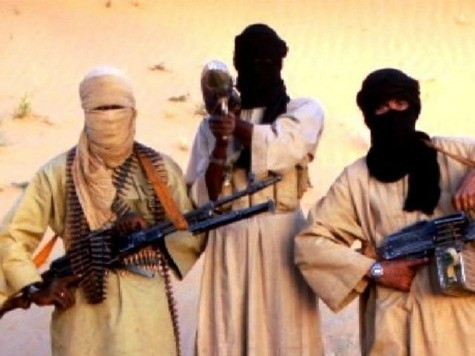SANAA, Yemen (AP) — Yemeni forces, reportedly backed by U.S. drone strikes, hit al-Qaida militants for a second straight day Monday in what Yemen officials said was an assault on a major base of the terror group hidden in the remote southern mountains. The government said 55 militants were killed so far.
The sprawling base was a rare instance of a permanent infrastructure set up by al-Qaida’s branch in the country, Yemeni security officials said. Built over the past months, it includes a training ground, storehouses for weapons and food and vehicles used by the group to launch attacks, they said, speaking on condition of anonymity because they were not authorized to release details to the press.
The assault appeared to be a significant escalation in the U.S. and Yemeni campaign against al-Qaida in the Arabian Peninsula, the terror group’s powerful branch in the southern Arabian nation. The United States has been striking al-Qaida positions in the country heavily with drone strikes the past two years, trying to cripple the group after it was driven out of several southern cities it took over in 2011.
But the group has proven highly resilient, spreading around the country and working from mountain areas. In a show of the group’s boldness, a video recently posted on Islamic militant websites showed the group’s leader Nasser al-Wahishi meeting openly with a gathering of dozens of militants in the southern province of Abyan.
The base is in a remote mountain valley called Wadi al-Khayala in the rugged Mahfad region at the border between Abyan, and the neighboring provinces of Shabwa, and al-Bayda.
The first strikes came Sunday in an assault a high-level government security committee said was an attack on training grounds for the group. Yemeni Interior Ministry said it lasted for several hours. Yemeni officials and tribal leaders said new strikes, believed to include U.S. drone hits, came Monday. Another airstrike Saturday in al-Bayda killed at least nine militants.
The ministry said in a statement Monday that the strikes the day before had killed at least 55 militants including three prominent figures. It identified the three as Mohammed Salem Abed Rabbo al-Mashibi, Fawaz Hussein al-Mahrak, Saleh Said Mahrak. It said identification of the dead was continuing, and that non-Yemeni Arab fighters were among those killed. It said the strikes hit in Wadi al-Khayala and two other locations, Lodiya and Ramtha. Tribal leaders in the area said those are locations at either end of the valley.
Yemen’s Supreme Security Committee, which includes the president, the defense and interior ministers and the head of intelligence, said Sunday the strikes targeted an important al-Qaida training camp that housed leading figures of the group. But it gave no further details.
The security officials and local tribal leaders said Monday’s strikes killed several militants, including one they identified as a local commander, Munnaser al-Anbouri. It was unclear how many militants died. It was possible to identify him because militants delivered his body to his family, who lives in the area, the officials said.
A tribal chief from the area said there were columns of smoke and flames of fire billowing from the location of the hideout Sunday, adding that the militants had been seen in the past parking their vehicles in bushes in the area. The tribal leader said he believed the fire was caused by the fuel tanks in the vehicles. In recent weeks, he said, the militants transported heavy weaponry to the area, including artillery. He and the other tribal leaders spoke on condition of anonymity for security reasons.
One of the security officials said the infrastructure for the base has been destroyed. He said the offensive on the camp was based on intelligence and “regional and international” cooperation, suggesting that neighboring Saudi Arabia may also have been involved in the planning.
In Washington, a Pentagon spokesman said he could not comment on any specific actions.
“But as you know, we have a very strong and collaborative relationship with the Yemeni government. We work closely together with them on various initiatives in the counterterrorism realm,” Army Col. Steve Warren said.
A spokesman for the CIA declined comment.
The escalation came after the return from the U.S. of Yemeni Defense Minister Maj. Gen. Mohammed Nasser Ahmed and his commanders following a two-week visit.
Washington ramped up its fight against Yemen’s branch of al-Qaida after it carried out a strike of unsuccessful bomb plots targeting Americans, including an attempt to bring down a U.S.-bound airliner with explosive hidden in the bomber’s underwear and a second plot to send mail bombs hidden in the toner cartridges on planes headed to the U.S.
The group’s fighters overran several towns and cities in southern Yemen in 2011, taking advantage of the political chaos amid a popular uprising against then-President Ali Abdullah Saleh, who was later driven from power.
A major 2012 government offensive, aided by the U.S. and Saudi Arabia, drove out al-Qaida militants from southern towns they took control of following the security vacuum a year earlier during a popular uprising against Yemen’s longtime leader Ali Abdullah Saleh. The group remained largely mobile and used rugged mountain areas for cover, often with approval from some tribal leaders.
Also late Sunday, a security official said anti-terrorism Yemeni forces have targeted a vehicle suspected of carrying al-Qaida operatives in Shabwa. Shortly after, a helicopter arrived on the scene to pick up the bodies and those injured, local witnesses said, speaking on condition of anonymity for fear of retribution.
On Monday, President Abed Rabbo Mansour Hadi decorated the anti-terrorism unit with a courage badge for the operation against al-Qaida operatives. The identity of those targeted was not immediately clear.
___
Associated Press National Security Writer Robert Burns contributed to this report from Washington.

COMMENTS
Please let us know if you're having issues with commenting.